Spring 2021 Honors Newsletter
Featured in this Issue:
- Introduction
- Enhancement Projects by Honors Students
- EWU Faculty Perspectives
- Let Bygones Be Bygones
- Recipes During Lockdown
- Journey Through Adversity
- Honors Donor Spotlight: Q & A with Jamie Zaiser
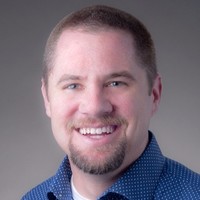
Introduction
What a year! To say that the 2020-2021 academic year has been strange is not only an understatement, but also stating the obvious. None of us knew exactly what this year would look like when we started. We knew it would be different thanks to the ongoing global pandemic, but we had no clue what different would look like. And, while it certainly hasn’t been an ideal year, the fantastic students and faculty of the EWU Honors Program found a way to still make it amazing!
Our mission and values highlight an emphasis on community. Given that gathering is one of the primary things COVID-19 asked us to avoid, creating, maintaining, and serving community was a particularly challenging task. Yet, as they always do, the honors community continued to lean into its values. For some, this involved starting Sunday dinner in their residence hall. For others, it was using social media to raise money to purchase and distribute socks to the homeless in Spokane. Still others spent time advocating for human rights campaigns. And some understood that simply virtually playing games together, was good for all. In short, even when we couldn’t be together, the students and faculty of the honors program made sure that our commitment to community was as strong as ever.
As we all head into a much needed summer break, I am filled with hope. I am hopeful that everyone will spend time this summer caring for, and restoring, self. This might seem like a strange hope, following a discussion of our commitment to community, but we cannot serve others if we have nothing left to offer. While this year has seen some great things, it has also taken a toll on all of us. Now, more than ever, we need to lean into self-care. So, I encourage everyone to be intentional this summer about getting outside, practicing meditation, reading a book for pleasure, or whatever practice you cultivate that is designed to care for, and be life giving, to self. Doing this is important, not only because of the toll this year has taken on us, but also because of the promise next year holds.
As EWU returns to a more normal version of campus life next year, I am looking forward to the opportunities for creating, maintaining, and serving community. As I look toward the fall, I am excited about everything from informal Friday coffee in the Honors Lounge, to an honors tailgate, before a football game, or serving the homeless at Blessings Under the Bridge, and working toward a more just Spokane. I am so excited for all of us to really build and experience the EWU Honors community. With this in mind, I encourage you to finish this academic year strong, lean into intentional self-care this summer, and come back to campus ready to create and serve community together.
Brian Davenport, PhD
Associate Dean for Honors & Community Engagement
Enhancement Projects by Honors Students
This section features the work of two honors students, who chose to add an honors enhancement/ contract to one of the non-Honors courses they were taking. Any Honors student can add an Honors enhancement/contract to an existing (non-Honors) course, to enhance the academic experience in the course. It is designed to help students dig deeper into material they are interested in learning more about, and to establish connections with EWU faculty, as they work closely with their professors to learn more. This is a great option for Honors students who have already fulfilled their general education requirements, but want to continue having a more profound academic experience in courses related to their areas of study.
The two honors students who are featured in this enhancement section of our newsletter are Katie Gower and Breanna Guzman. Katie’s major is Political Science with a Philosophy minor and added an enhancement contract to the course PHIL 311: Social and Political Philosophy taught by David Weise, while Breanna’s major is Communication Sciences and Disorders and added an enhancement contract to the course CMSD 442: Intervention of Speech and Language Disorders taught by Lindsay Williams.
Katie Gower
Abstract
“John Stuart Mill and Proportional Representation:
How to Ensure Political Equality in a Representative Democracy”
In his analysis of representative democracy and its demerits, English philosopher and economist John Stuart Mill proposes a solution to address the political inequality that often proliferates in representative systems. Mill argues for proportional representation, a type of representation encompassing multiple methods that ensure minority groups are represented. Through his political and philosophical analysis of Mill’s book “Considerations on Representative Government”, a compelling argument for proportional representation can be derived. Political representation is a critical subject within the field of political science, and understanding the many forms and methods of representation allows political scientists to evaluate the political freedom of individuals within a democracy, how well the individuals are truly represented, and how effective, or ineffective, the method of political representation renders the government and society as a whole.
The ideal of a true democracy, in which all of the people are represented equally, can be difficult to achieve, and political scientists and philosophers have strived to find solutions to this problem. Mill believed that this problem, and two additional weaknesses within democracies, can be solved by addressing the method of representation within that democracy.
Proportional representation creates a solution to two dangers of democracy as identified by Mill: 1)T the inaptitude of the ruling body, and 2),The interests of said ruling body diverting from the interests of the people.
As Mill argues, proportional representation creates a number of benefits for both the individual and the democracy as a whole. By analyzing its merits, further understanding of democracy and the importance of representation can be established.
Follow this link to read Katie’s full enhancement project paper on Honors web site.
Breanna Guzman
Summary
Home Literacy Kit
When finding the perfect project to carry out, I came to the conclusion that my focus should be around intervention of speech and language disorders for younger children. Younger children and speech related disorders have been an interest of mine since the beginning of this program.
After some discussion, I decided to create an at home literacy kit that could be presented to caregivers to begin early literacy learning in the homes. I have seen changes in my personal life as my parents have read to my sisters and I since we were young. As I completed this project, I grew my understanding of early literacy, especially in the ways in which children can thrive through language and reading, by incorporated it into their daily lives. Helping children in this way has always been a passion of mine. Through creating this kit, I came to better understand how a child’s skills can start at a young age, with the help of early language intervention in the home.
As I started to research for this project, I realized I wanted to incorporate a bilingual aspect, specifically Spanish, allowing my literacy kit to be available for a wider range of individuals.
I chose a book to focus my project on, that had a Spanish version of the text, as well as an audio CD. The book I chose, “Pete the Cat: I Love My White Shoes”. With this book in mind, I started to create activities for the children to complete individually, or with a grown-up, that will hopefully expand their language skills.
Other aspects of this project included a reading log to track the progress of time spent reading books, as well as a writing journal with a few prompts to get the writing started. To make my project as user friendly as I could for the families who may receive this kit, I also included different links to online resources that they can utilize to further their understanding of early literacy.
My project was very beneficial for my learning, as I was working through my courses this semester. I was able to relate this project heavily back to my “Intervention of Speech and Language” course. Through early literacy with children, we may be able to limit the amount of intervention that is needed for the child in the future. The whole goal of intervention is to improve the skills that may be falling behind for a child, but there is a possibility this need can be reduced with resources like this kit. Completing this project as my Honors enhancement project was a great experience. I was able to apply my interests of working with the younger population through speech and language aspects, as well as apply them to the Honors program by creating a better community around me, and sharing helpful information that will hopefully decrease the need for intervention in the future generations. My hope for this project is that others in the future will enjoy this information as much as I enjoyed researching, bringing it together and creating this final project.
EWU Faculty Perspectives
By Kasey Hermens, April 2021
The year of 2020 was defined by the COVID-19 virus, Zoom meetings, and masking up. Many conversations were centered on the student experience, and rightfully so, but there wasn’t much chatter about the impact on faculty members, as they zigged and zagged through the labyrinth of adaptation to a global pandemic. I wanted to shed some light on the perspectives of faculty, and open up the conversation to include both professors and pupils alike.
I interviewed two instructors and we spoke about both the hardships and the silver linings the past year made.
Travis Masingale
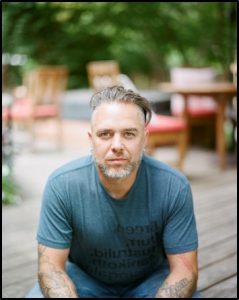
An associate professor at Eastern Washington University, passionate about teaching Visual Communication Design courses and helping students achieve their goals. He considers himself a Bauhaus fanboy, a child of postmodernism, and a “specialist in obscure details.” He loves spending time reading books that get him thinking, spending time with his family, and escaping outside to hike the bluff.
Kasey: Thank you for meeting with me, I really appreciate your willingness to let me ask you some questions. Hopefully you have some insights that you’d have fun sharing. I’d first like to ask, what did your expectations look like when this transition to virtual learning happened about a year ago?
Travis: Oh, my expectations were low. I really lowered them… For myself, they were high because that’s just who I am but they were shifted to take care of the students and to provide space for the break from our normal routine. [I] really backed off and provided a space for reflection for the students, especially in our Design 200 class… [t]rying to create ways to tether students to school; to keep them coming back to the Zoom class, stuff like that.
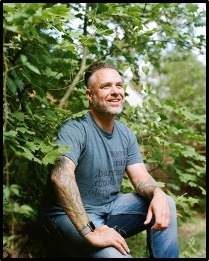
K: How have you managed your mental health during this time? I know mental health has been a big topic of discussion lately.
T: I’ve been meditating since the summer of 2016. I had a nervous breakdown and it was either get on more meds or stop meds and meditate. I started meditating and I had a pretty regular practice but I’d usually fall off at 90 days. So, last May was like, the lowest of low and I stopped meditating because I just couldn’t get out of bed in the mornings. I would just doom-scroll.
So, June 1st I committed and started [meditating] and a month went by, and another month, and then I was into August and was like, “Oh my God, I’m going,” so I decided, “I’m gonna do this for a year in the morning.” I haven’t stopped since June 1st .
I have my struggles too but my meditation practice in the past month has really grown about love and acceptance, and meeting people where they’re at. It’s hard in a student-centered space because we have this dual role as teachers where we’re supposed to push you as hard as we can to get students to do more than they expected they can. At the same time, we’re not supposed to break you. It’s this fine line of a balancing act, you know?
K: I know a lot of students have felt like they’ve missed out on the community aspect of college or university. Do you feel like faculty has missed out on that as well since everything has been remote learning?
T: For sure. In the fall and spring, it was like someone tied my arms behind my back. I am very empathetic, I read people, I’m sensitive, you know, if you will. Not being able to like, look at people’s faces, not being able to judge body language, and then not to have the community of students to get to know, it was really hard. Without that [sense of community], students would just be names on a roster and I don’t get to know their quirks. I get to know, maybe, their work visually but I don’t get to know them.
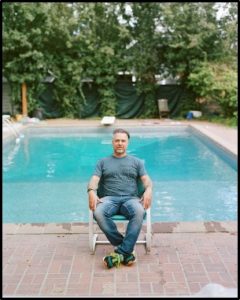
I can’t imagine being a student right now, with the amount of technology that’s been thrown at students per class. Every faculty member is making this [stuff] up on their own, every department has some loose guidelines. As a student, the resiliency and the ability to adapt among this section of students for the past year… they are set for the modern world. They strengthened up that area of their mind and way of knowing the world. I think that all of us have atrophied this social aspect.
K: Is there anything you’re looking forward to?
T: I’m just looking forward to this summer. I think… a bunch of us faculty, we didn’t take last summer off. I normally don’t work in the summer, I do personal research. We planned for fall quarter hardcore, and I know I’m looking forward to a breath of space and to not be on Zoom all day and worry about 90 human beings and whether I’m doing enough for them.
Dr. Sarah Mount
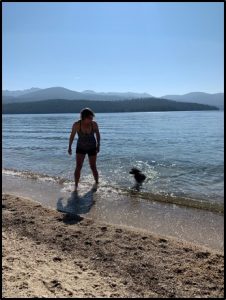
Sarah is the program director of the Undergraduate Public Health Program at Eastern Washington University, teaching an array of public health education courses; ranging anywhere from program planning, to health disparities, to grant writing. In her free time, she enjoys teaching herself instruments like the banjo and ukulele, playing board games like Ticket to Ride, and being outdoors with her new addition to the family, her puppy named Otter.
Kasey: I appreciate that you’ve taken some time out of your day to meet with me. My first question is, what did your expectations look like when the transition to virtual learning happened this time last year?
Sarah: Boy, if it had been… if COVID had hit any other quarter it would have been awesome. Spring quarter, for me, was really the worst possible quarter to try to put those classes online, especially the program planning class, which I feel really takes a lot of work behind the scenes to do that well online. I’d become very, you know, dependent on seeing you guys every, you know, two days, right? Being able to really push our two hours together as far as I could. When I’m planning something online, you don’t have as good of a feel for the timing of it, right? You don’t want to overburden the students, but at the same time, you know, you have to get through a lot and you don’t want to undercut it. So, I was pretty much upside down a year ago this time. This spring is going a lot better. It was a learning experience.
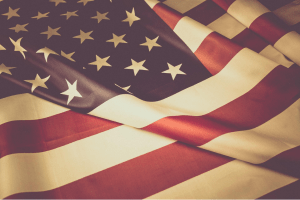
by Conner Kautzman
Within a society where politics have become a way of life, a new divide has begun to form. In this separation, there are multiple sides. The two most popular are liberal and conservative. Both have stark differences and bitterly dislike each other.
As for my situation, living as a moderate in between both political realms is tough enough. Having two roommates who are liberal and conservative seems impossible to live with.
However, this is not the case for us.
Rob, the conservative, lives on one edge of the apartment. While Erin, the liberal, lives on the other. Both frequently talk to each other and sometimes debate on political issues.
“Liberal’s politics are completely anti-american.” Said Rob, when I asked what he thinks of Erins political beliefs. “They are using socialism to take over our government and depleting it’s greatness. Hell, our 2nd amendment is under attack!”
When I asked Erin what she thinks of Rob’s political beliefs, she replied, “Conservatism and Trumpism is all about hate. Hate of Latinos, Hate of African Americans. Hate of everything that’s not white. If anything, that’s what’s tearing down America. They don’t know what’s best for the poor in this country. They only care about the top 1%.”
Obviously, both sides have bitter disagreements for the other. As a moderate, I believe in the economics of conservatism. Yet, I support the civil rights of liberalism. I take qualities from both sides to formulate my political opinion on something.
“My political beliefs are based on my personal experiences.” Said Erin when I asked what motivates her beliefs. “I agree with Erin, mine are too.” Rob replied.
I believe this is the case for anyone who follows politics. It is built on your own personal experiences. For example, while I was self employed during the covid-pandemic of 2020, I learned all about the taxes associated with it. I personally believed the self employment tax rate of 15.3% was way too high. I started leaning toward a conservatism belief of no taxation without representation and that taxes should be lower for everyone. So, even with bitter disagreements politically, how could the both of them live in the same household?
“I don’t judge others based on their political preference.” Said Erin. “If that person is decent and cares about others, that is who I will see them as. Not for who they voted for. If someone voted for Trump, then that is their right to do so.” Rob replied, “Erin and I may have stark differences politically, but that doesn’t matter. Like, sure she’s a liberal. Yet, she is also one of the kindest people I have ever met and that, to me, is what is most important.”
It is simple enough: “Let Bygones be Bygones.” That is how we are all able to live under the same roof. We let our political beliefs off to the side and judge each other based on our qualities. We see the good in each other that is necessary to get along. I believe this can be applied to society itself. Yes we may have different political beliefs and lived experiences. However, we are more alike than different. If we can start seeing that in each other, I believe then we can start healing that divide that exists within society.
During lockdown I was able to experiment with some quick, easy, and healthy recipes. I wanted to share them with the rest of the Honors community too since they are so yummy! -Allison Fox


by Cristal Blanco-Sanchez
Things move very quickly in our society and we are constantly expected to be productive, and to know our next move. For this reason, self-care is not often seen as a priority. Many times, we see it as a reward, or something we earn. We may think we don’t deserve to do a self-care activity because we have not yet reached a goal or completed a task.
Why is self-care important? Self-care not only prevents us from experiencing burn out, but it also helps us take care of our needs and wants. Self-care can be as simple as going out in the sun for 30 minutes. It can also be distancing ourselves from harmful situations or even people. By taking some time to engage in self-care, we can relieve some of the stress and pressures of everyday life. Some areas of wellness where we can practice self-care are emotionally, physically, socially, spiritually, intellectually, environmentally, and financially.
Over time, you can build a routine and identify other forms of self-care that work for you. Something that is important to note, is that self-care should be something you actively plan, instead of something that happens randomly. To make this easier, writing it down on your calendar can be helpful. Along with this, letting people around you know your plan, can help increase your commitment and hold you accountable. Lastly, actively looking for opportunities to practice self-care can help you get in the habit of actually doing it.
Here are some simple ways you can practice self-care daily:
- Go for a walk
- Do a breathing exercise
- Meditate
- Read a book for fun
- Clean your room
- Have a phone-free morning/night
- Listen to a podcast
- Watch the sun rise or set
- Connect with someone you miss
- Listen to your favorite song
- Cook a meal
- Paint
- Go for a hike
References
Glowiak, M. (2020, April 14). “What is self-care and Why is it important for you?”
Retrieved from https://www.snhu.edu/about-us/newsroom/2019/04/what-is-self-care
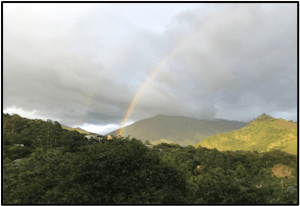
by Jenna O’Lague
As this unique time in our educational journey comes to an end, it is impossible to deny the hardships and challenges we all faced. COVID-19 has changed our lives in more ways than we could imagine, and in some ways, it can feel like students have been cut off from each other but what continues to connect us is our values, discipline, and dedication to learning despite challenges. Throughout the pandemic and, more specifically, this quarter, a fellow honor student (Allison) and I wanted to share photos and thoughts about what environments we have been able to stop and appreciate even through uncertain times.

Because classes were moved online, I decided to return to Ecuador, where my family lives, and study from here. Even though I wasn’t enthusiastic about this change, I have come to appreciate being able to spend this year with my family. I am so grateful that I was able to be with my family (not to mention, the views are incredible)! Collaborating with Honors students as we created this newsletter has been a great way to stay better connected with the honors community, during this time.” -Allison
“I moved to Spokane, Washington in 2017, in hopes to find a bigger calling for my life. Fast forward to 2019, I was accepted into EWU and completed my first two quarters without much push-back, but COVID-19 threw a wrench in my plans I couldn’t have predicted. I have been back in San Antonio for almost a year now, and while thinking of all of the experiences I was missing not being in Washington, I stopped to admire where I was, and held fast to the belief that everything happens for a reason.

Although classes have been more difficult for everyone because we are all far from each other, for some reason, it feels more distant knowing you’re two thousand miles away from your school. But I will say, being in Honors has helped me feel more connected and knitted together with my peers, so I thought it would be nice to share the environment I was in, while we all went through this unique time. These are a few photos I took on my walks, during the lockdown.” -Jenna
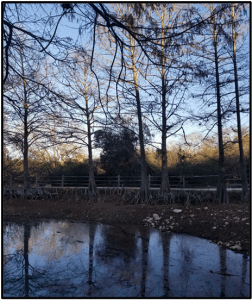
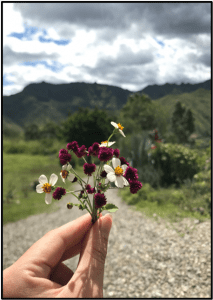
by Caden Petersen
Jamie Zaiser is a graduate of EWU, class of ‘03, and a donor to the EWU Honors program! She kindly set aside some time for me to ask her some quick questions over the phone regarding her time here as an Honors student, as well as her thoughts on the honors program today and what she hopes her donations will help to accomplish. Thank you very much Jamie for your time, your thoughtful answers, and your support of the EWU Honors program!
Why don’t you start by telling me a little bit about yourself, and your time here at Eastern?
I was there a while ago, 99-03. I went there on an Honors Scholarship and graduated with a degree in International Affairs with a Spanish minor and did a lot of work with Student life and Eagle rosters.
Tell me about an experience you’ve had or a person you’ve met that was involved in Eastern’s Honors program that you’ve always remembered?
I think the biggest thing about Honors is I was able to go to college because I had an honors program scholarship that covered my first two years of tuition, and without that I wouldn’t have been able to go to a four year school. So that’s what allowed me to go, I mean that was the biggest thing for me. If I wanted to go to school I had to find a way to do it, I didn’t have family support or monetary support backing me. So that’s what was the most important thing for me, and then once I got there the seminar classes, especially freshman year. The small group, the cohort, was just so impactful I think from the way I looked at learning, you know, how I saw things, how I interpreted what I was being taught.
It just impacted my view of how… I think that was the greatest impact for it, you know I came from this really small town, Castle Rock, and I just hadn’t experienced a lot before I went to school, so it was a good thing for me to be in that environment, and I think that was y’know, first of all getting me to school, and then putting me in this cohort with these specific classes that just provided like this lens to see my range though the rest of the four years and beyond is what the program did for me.
What prompted your first gift to the Honors program?
Really I was wanting to give back. Like I said, their scholarship is what allowed me to go to school, so I always thought that if I was able to get in a position to be able to give back then that’s where I would do it.
What do you hope your donations will help to accomplish?
I really hope that the honors program will continue to give these scholarships to students, specifically female students, first generation students, minority students who, without that help, wouldn’t be able to go to school and would be able to come to school and gain these valuable experiences and have these opportunities and have the financial support to do so.
Alumni, we want to hear from you
Are you an Alumnus of EWU and Honors? Do you have an story you would like to share with us? Email your story to Dori Roberts at droberts@ewu.edu for an opportunity to be featured in upcoming Newsletters and on the Honors website!
Interested in writing and journalism?
Do you want to gain experience with designing and editing a Newsletter? EWU Honors is looking for current Honors students that are willing to write articles, take pictures, and construct and edit future Newsletters. If you are interested please email Hope Sands, as honorsstudent@ewu.edu for more information.
Make a difference for Honors!
Contact Courtney Susemiehl to learn how you can support Honors students.
Courtney Susemiehl
Director of Philanthropy – Honors Program
59-359-6703
csusemie@ewu.edu
Give to Honors: http://ewu.edu/supporthonors



